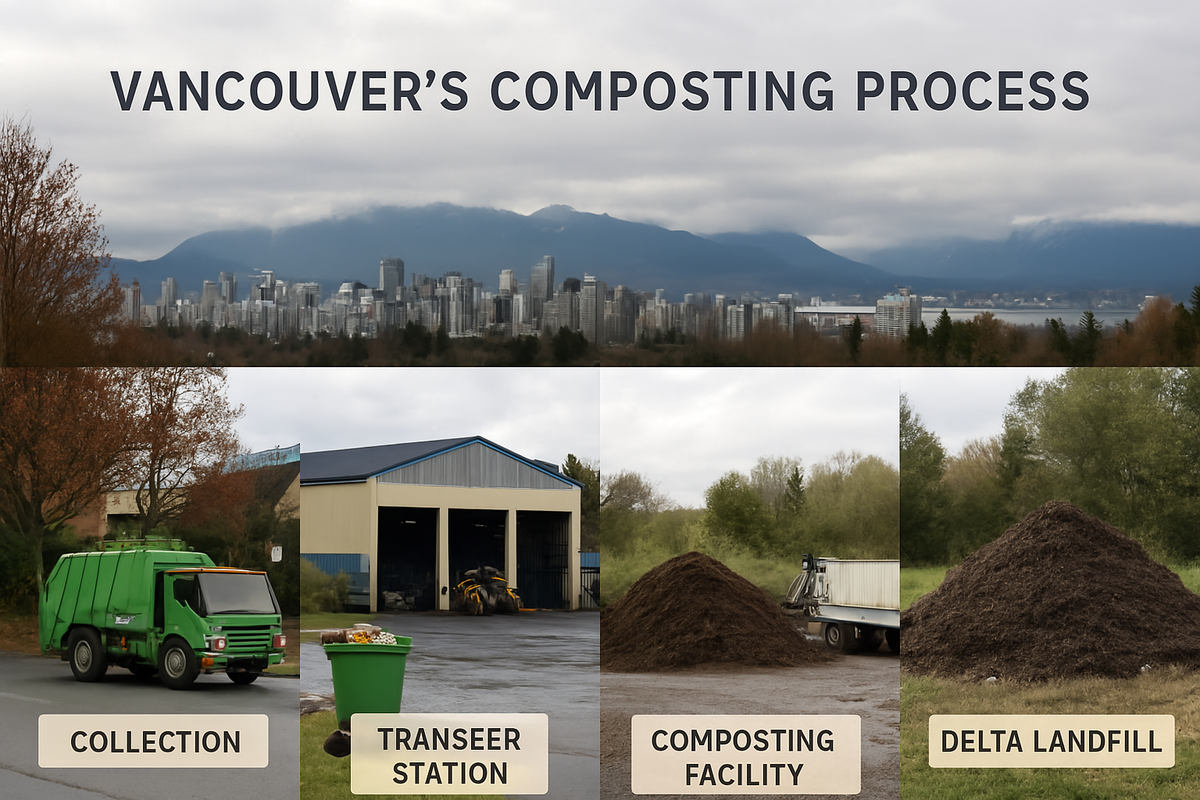
I compost some of my garden and household organic materials. The rest goes into the city Green Bin. I've often wondered what happens to it after it's picked up by the city.
In Vancouver, composting is a vital part of the city's sustainability efforts. The City of Vancouver's composting program effectively transforms organic waste into valuable resources through a structured process involving collection, transportation, processing, and distribution.
Collection
Vancouver's Green Bin Program accepts a wide range of compostable materials. Here's a detailed list of what can be put in the green bin:
Food Scraps
- Meat and Bones: Including raw and cooked meat, fish, and poultry.
- Vegetable and Fruit Scraps: Peels, cores, and any other vegetable or fruit waste.
- Dairy Products: Cheese, yogurt, and other dairy items.
- Grains and Bread: Rice, pasta, bread, and cereal.
- Eggshells: Both raw and cooked.
- Seafood Shells: Shells from shrimp, crab, and other seafood.
- Small Amounts of Fat, Oil, and Grease: Absorbed in paper towels or newspaper.
Yard Waste
- Leaves and Grass Clippings: All types of leaves and grass.
- Branches and Prunings: Short branches and prunings less than 10 cm thick and 50 cm long.
- Sod and Soil: Small amounts of sod and soil are accepted1.
Food-Soiled Paper
- Paper Towels and Napkins: Used paper towels and napkins.
- Pizza Boxes: With food residue (no plastic pizza saver).
- Coffee Grounds and Filters: Paper coffee filters and tea bags.
- Newspaper: Used to wrap food scraps or line kitchen containers2.
Other Items
- Wooden Chopsticks and Skewers: Small wooden items like chopsticks and skewers.
- Houseplants: Without soil.
- Hair and Nail Clippings: Human and pet hair or nail clippings1.
Important Notes
- Plastic Bags: Avoid using plastic bags, even those labeled as biodegradable or compostable, as they can contaminate the compost2.
- Large Branches: Branches thicker than 10 cm or longer than 50 cm should be taken to the Vancouver South Transfer Station2.
City collection crews empty these bins into specialized vehicles and transport the contents to the Vancouver South Transfer Station for initial inspection. Here, visible contaminants like plastics and non-compostable materials are removed to ensure the purity of the composting stream. City of Vancouver+6City of Vancouver+6City of Vancouver+6City of Vancouver+7City of Vancouver+7Vancouver Council+7
Transportation and Processing
Stages of Processing
- Collection and Transportation: Once collected, the compostable materials are transported to the Vancouver South Transfer Station or directly to composting facilities1.
- Initial Processing: At the transfer station, the organic waste is sorted to remove contaminants like plastics and large branches1. This step is crucial to ensure the quality of the compost.
- Composting: The sorted organic waste undergoes composting, which involves several stages:
- Mesophilic Stage: Initial decomposition occurs at moderate temperatures.
- Thermophilic Stage: The compost heats up, accelerating the breakdown of organic matter.
- Curing and Cooling: The compost is allowed to mature and stabilize.
- Screening: The finished compost is screened to remove any remaining impurities.
After the initial sorting, the organic material is loaded into trailer trucks and transported to a private composting facility operated by Green For Life (GFL) Environmental in Delta. Upon arrival, GFL staff conduct a secondary inspection and employ mechanical processes to eliminate any remaining contaminants. The cleaned organic waste is then arranged into piles and left to decompose over approximately four months, resulting in nutrient-rich compost. City of Vancouver+1City of Vancouver+1
Distribution: End use of Compost
The finished compost serves multiple purposes:City of Vancouver+3City of Vancouver+3Vancouver Council+3
- Commercial Sales: The compost is sold to residential gardeners, commercial landscapers, and organic farmers, providing a sustainable soil amendment that enhances soil health and fertility. City of Vancouver+2Vancouver Council+2City of Vancouver+2
- City Use: The City of Vancouver's Parks Board and Engineering Services' Greenways Branch utilize the compost for various landscaping and greening projects, contributing to the maintenance and beautification of public spaces. This compost is particularly beneficial for maintaining the health and vitality of the city's extensive network of parks, gardens, and community green spaces. This practice helps close the loop in the city's organic waste management system, ensuring that valuable nutrients are returned to the soil and supporting the growth of healthy plants and trees throughout the city. Vancouver Council
Conclusion
The composting process in Vancouver is a comprehensive system. Vancouver not only diverts organic waste from landfills but also creates a valuable product that supports both private and public landscaping efforts By participating in the Green Bin Program and supporting local composting initiatives, residents contribute to a greener, more sustainable city.
Tags: #WBN News - Kitsilano Edition #Karalee Greer #Kitsilano #Kits #Vancouver Composting #Green Bin Program #Organic Waste #Waste Reduction


